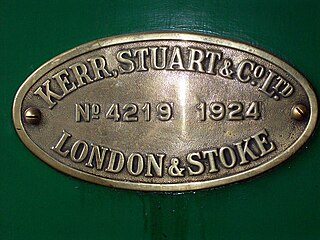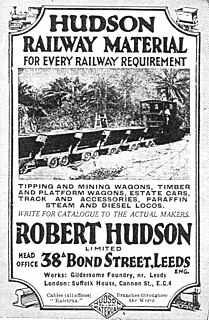History
Founded at Bradford by Edward Exley about 1920, the products were initially locomotives, in live steam, clockwork and electrically powered, in gauges 0 and 1, which were made to order. By the 1930s, 0 gauge coaches had joined the range of products, probably Exley's most successful line. In the later 1930s high quality 00 gauge coaching stock was added to feed a growing market in this new scale.

Clockwork refers to the inner workings of either mechanical machines called clocks or other mechanisms that work similarly, using a complex series of gears.
By 1952 Edward Exley (Sales) Ltd had moved to Baslow in Derbyshire and Edward Exley had resigned as a Director of the Sales Company in July 1955.

Baslow is a village in Derbyshire, England, in the Peak District, situated between Sheffield and Bakewell, just over 1 mile (1.6 km) north of Chatsworth House. It is sited by the River Derwent, which is spanned by a 17th-century bridge, alongside which is a contemporary toll house.

Derbyshire is a county in the East Midlands of England. A substantial portion of the Peak District National Park lies within Derbyshire, containing the southern extremity of the Pennine range of hills which extend into the north of the county. The county contains part of the National Forest, and borders on Greater Manchester to the northwest, West Yorkshire to the north, South Yorkshire to the northeast, Nottinghamshire to the east, Leicestershire to the southeast, Staffordshire to the west and southwest and Cheshire also to the west. Kinder Scout, at 636 metres (2,087 ft), is the highest point in the county, whilst Trent Meadows, where the River Trent leaves Derbyshire, is its lowest point at 27 metres (89 ft). The River Derwent is the county's longest river at 66 miles (106 km), and runs roughly north to south through the county. In 2003 the Ordnance Survey placed Church Flatts Farm at Coton in the Elms as the furthest point from the sea in Great Britain.
Locomotives were made available after the war, mainly to order, but in the late 1950s Edward Exley sold the loco construction part of the business to Stanley Beeson, who had made locos for a number of Exley clients. Coaches were listed until 1962 when there was a terrible fire which destroyed the Bradford premises and most of the tools. At this point Edward Exley decided to retire.
The company at Baslow continued to offer coaches but discontinued the 00 gauge range as the manufacturing facility was lost in the fire. The 0 gauge models were listed as available until January 1995, but were in fact being made by outside workers to order.
Because of the premium nature of Exley's products, they tend to be well preserved, and many examples survive today. They are highly collectible and good examples of 0 gauge coaches often change hands at auction for hundreds of pounds.
The company is still in existence, although it is not currently trading. Most recently it has acted as a restoration company for existing Exley models and as a point of contact for technical queries.

A Fairlie is a type of articulated steam locomotive that has the driving wheels on bogies. The locomotive may be double-ended or single ended. Fairlies are most associated with the Ffestiniog Railway in Wales.
The Ives Manufacturing Company, an American toy manufacturer from 1868 to 1932, was the largest manufacturer of toy trains in the United States from 1910 until 1924, when Lionel Corporation overtook it in sales.

1 gauge, gauge 1 or gauge one is a model railway and toy train standard that was popular in the early 20th century, particularly with European manufacturers. Its track measures 1.75 in, making it larger than 0 gauge but slightly smaller than wide gauge, which came to be the dominant U.S. standard during the 1920s.

The British Rail Class 15 diesel locomotives, also known as the BTH Type 1, were designed by British Thomson-Houston, and built by the Yorkshire Engine Company and the Clayton Equipment Company, between 1957 and 1961. They were numbered D8200-D8243.

Graham Farish is a company that produces large quantities of British outline model railway equipment in N gauge.
Dapol Ltd is a Welsh model railway manufacturer based in Chirk, Wales. The factory where design and manufacturing take place is just over the border in England. The company is known for its model railway products in N gauge and OO gauge.

The London, Midland and Scottish Railway (LMS) Royal Scot Class is a class of 4-6-0 express passenger locomotive introduced in 1927. Originally having parallel boilers, all members were later rebuilt with tapered type 2A boilers, and were in effect two classes.

The London Midland and Scottish Railway (LMS) Garratt was a class of Garratt 2-6-0+0-6-2 steam locomotive designed for heavy freight. A total of 33 were built from 1927, making them the most numerous class of Garratt in Britain.

Sentinel Waggon Works Ltd was a British company based in Shrewsbury, Shropshire that made steam-powered lorries, railway locomotives, and later, diesel engined lorries, buses and locomotives.

The GWR 1400 Class is a class of steam locomotive designed by the Great Western Railway for branch line passenger work. It was originally classified as the 4800 Class when introduced in 1932, and renumbered in 1946.

Kerr, Stuart and Company Ltd was a locomotive manufacturer from Stoke-on-Trent, England.

W. G. Bagnall was a locomotive manufacturer from Stafford, England which was founded in 1875 and operated until it was taken over in 1962 by English Electric.

Thomas Hill (Rotherham) Limited was a company which repaired and sold steam road vehicles, diesel and electric road vehicles and railway locomotives. It later made its name building and rebuilding diesel locomotives.
Lima S.p.A was a brand of railway models made in Vicenza, Italy, for almost 50 years, from the early 1950s until the company ceased trading in 2004. Lima was a popular, affordable brand of 00 gauge and N gauge model railway material in the UK, more detailed H0 and N gauge models in France, Germany, Italy, Switzerland, and the United States as well as South Africa, Scandinavia and Australia. Lima also produced a small range of 0 gauge models. Lima partnered with various distributors and manufacturers, selling under brands such as A.H.M., Model Power, and Minitrain. Market pressures from superior Far Eastern produce in the mid-1990s led to Lima merging with Rivarossi, Arnold, and Jouef. Ultimately, these consolidations failed and operations ceased in 2004.

Thomas Green & Son, Ltd. were engineers who manufactured a wide range of products at the Smithfield Foundry, Leeds, United Kingdom.

Robert Hudson Ltd was a major international supplier of light railway materials, based in Gildersome, near Leeds, England. The name was later changed to Robert Hudson (Raletrux) Ltd.

The T class are a class of diesel locomotives built by Clyde Engineering, Granville for the Victorian Railways between 1955 and 1968.
Henry Cyril Casserley was a British railway photographer. His prolific work in the 1920s and 1930s, the result of travelling to remote corners of the railway network in the United Kingdom and Ireland, has provided subsequent generations with a valuable source of illustrations for books and magazines.


















